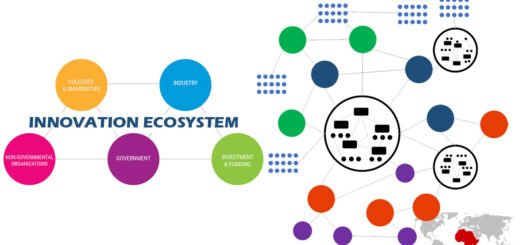Leading Africa’s Digital Advancement: Paving the Way
Introduction
In today’s rapidly evolving world, the transformative power of digital technologies is reshaping economies and societies worldwide. Nowhere is this potential more significant than in Africa, a continent ripe with opportunities and challenges. As Africa embraces the digital age, the role of leadership becomes paramount in steering the course towards progress. From policymakers to government executives and institutional leaders, each plays a crucial role in driving the development of an efficient digital ecosystem to propel Africa forward.

Source: Hatcher-Mbu, B., Parker, M. and Claudine (2021) USAID Digital Ecosystem Framework, Principles for Digital Development. Available at: https://digitalprinciples.org/getting-familiar-through-frameworks-understanding-the-digital-ecosystem-for-improved-development-outcomes/ (Accessed: 08 February 2024).
The Imperative of Policy Leadership
Effective policy frameworks lay the foundation for digital innovation and adoption. Policy leaders must enact forward-thinking regulations that foster a conducive environment for digital investment and entrepreneurship. By crafting policies that prioritize digital infrastructure development, data privacy, and cybersecurity, policymakers can spur technological advancement while safeguarding the interests of citizens and businesses. Additionally, initiatives to bridge the digital divide through equitable access to connectivity and digital literacy programs are essential for inclusive growth and development.
Empowering Government Executives
Government executives wield significant influence in shaping the digital landscape of their respective nations. By championing initiatives such as e-governance, digital identity systems, and smart city solutions, leaders can streamline public services, enhance transparency, and promote citizen engagement. Embracing emerging technologies like blockchain and artificial intelligence enables governments to tackle corruption, improve healthcare delivery, and optimize resource allocation. Moreover, strategic partnerships with the private sector and international organizations can leverage resources and expertise to accelerate digital transformation efforts across all sectors.
Institutional Leadership Driving Innovation
Institutions, both public and private, play a pivotal role in driving innovation and entrepreneurship in Africa’s digital ecosystem. Institutional leaders must foster a culture of innovation by investing in research and development, nurturing talent, and facilitating collaboration between academia, industry, and government. By establishing technology hubs, incubators, and accelerators, institutions can provide crucial support to startups and SMEs, catalyzing the development of homegrown solutions tailored to Africa’s unique challenges. Furthermore, promoting digital skills development and lifelong learning ensures that Africa’s workforce remains agile and competitive in the digital economy.
Alleviating Challenges and Exploiting Opportunities
Leadership in digital technology is not just about addressing current challenges but also about seizing emerging opportunities. From addressing infrastructure gaps to leveraging emerging technologies like the Internet of Things (IoT) and 5G, proactive leadership is essential to capitalize on Africa’s digital potential. By harnessing the power of digital agriculture, fintech innovation, and e-commerce, Africa can drive economic diversification, financial inclusion, and job creation. Moreover, initiatives to promote digital entrepreneurship, creativity, and innovation empower African youth to become drivers of change and agents of progress in their communities.
Conclusion
In conclusion, the role of leadership in developing digital technologies is pivotal for Africa’s sustainable development journey. Policy makers, government executives, and institutional leaders must collaborate in synergy to create an enabling environment for digital innovation and adoption. By prioritizing investment in digital infrastructure, fostering digital skills development, and promoting innovation ecosystems, Africa can harness the transformative potential of technology to address pressing challenges and unlock new opportunities for growth and prosperity. Together, let us embrace visionary leadership to chart a course towards a digitally empowered Africa.
Related post: Understanding AI: Benefits and Risks for Ordinary Citizens in Africa; Africa’s Digital Journey Through Time – Video




[…] post: Leapfrogging the Future: How AI can Transform Africa | AI Capacity Building in Africa | Unlocking Africa’s Potential…
[…] ABNT. (2024). The Impact of Artificial Intelligence on African Economies. Retrieved from https://abnt.com/?p=37 […]
[…] Related posts: Bridging the digital divide for inclusive & sustainable developmentReflection on the Digital Transformation Strategy for Africa (2020-2030)…
[…] posts: Bridging the digital divide for inclusive & sustainable developmentReflection on the Digital Transformation Strategy for Africa […]
[…] Related posts: Reflection on the Digital Transformation Strategy for Africa (2020-2030) […]